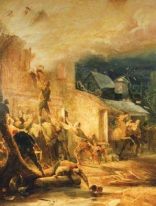
|
Previews, containing 10% of each book are available on Google Books. View our catalogue.
|
XVI - Hetty Wesley Q wrote a huge number of apparently fictional tales but many were actually inspired by historical facts. ‘Hetty Wesley’ is an exception to this as it was clearly based on the facts of an extraordinary family and, although not Q’s favourite of his novels, is to my mind quite his most brilliant and informative. Whilst the histories of John and Charles Wesley form part of the fabric of British history with their huge impact on religious faith and peoples’ daily lives, far less is known about the rest of their supremely talented, and in many cases, tragic, notably their mother, Susannah (née Annesley) and one of their sister, Mehetabel (Hetty). Susannah, the daughter of a dissenting vicar and the maternal grandaughter of another dissenting vicar was, almost incredibly, one of twenty five siblings and was, herself, the mother of at least nineteen children. In both instances most of the children were either stillborn or died early in their infancy. Converting to Anglicanism upon her marriage to a High Church Tory clergyman, Samuel Wesley, Susannah drew upon her own home education as the daughter and granddaughter of university-educated clergymen to acquire a genuine love of learning in all her children and she is notable for ensuring that her daughters were as well educated as her sons, which was extremely uncommon in her times, and for instilling a deep sense of obedience and living according to God’s will in all her surviving offspring. This had significant consequences not just in the development of Methodism but in the refusal of her daughters to withstand the instructions and orders of her children especially those of Susannah’s husband, Samuel, which led to tragedies in the lives of her children especially, again, Hetty. If a tale of the lives of Susannah and her family had been proposed as a work of fiction by a novelist then it would almost certainly have been rejected as simply too fanciful. In fact, Q’s tale ‘Hetty Wesley’ draws extensively upon, and sticks strictly to, the known facts of the family. The Wesley siblings grew up with an overbearing and authoritarian father whose word and rules could not be disobeyed, experienced unrequited love, romances prohibited by their father, and tragedy within the lives of their own children. On the other hand they were extremely well-educated by their enlightened mother and Hetty, in other circumstances might well have become one of Britain’s best loved and most renowned poets. Given that in Jacobean and Georgian times most daughters were brought up to display accomplishments in sewing, drawing and music but not in knowledge. They were expected to behave with perfect etiquette and adorn the scenery before being married off as soon as possible demonstrating that Susannah was an extremely unusual mother whose approach both advantaged and disadvantaged her children. Beyond all this, the family grew up in relative poverty since their father, Samuel, was anxious to advance his position and spent his income on travel and his personal library.
The children rarely had enough to eat or sufficient clothes to wear but the poverty has to be described as relative since Samuel and Susannah were able to employ a number of servants and farmboys; that a poor family could still afford to employ staff alone demonstrates the real poverty of the lowest members in society. Even more able than her brothers John, Charles and Samuel (the younger), Hetty was an extremely intelligent and accomplished person, able to speak three languages and read the New Testament in Greek by the age of nine. She wrote many poems mostly now lost but all that are known are included in this volume. Certainly the most assertive of Susannah’s daughters, it was both to Hetty’s credit and her tragedy that she was to to naively fall in love and incur the wrath and lack of forgiveness of her father who forced her into a marriage to a man of little learning that she didn’t like let alone love. Doubtless her adult circumstances, an extremely unhappy marriage to a bullying drunkard and wastrel and living in damp accommodation polluted by lead fumes from her husband’s business contributed to her ill health, her stillborn children and her early death at the tragically early age of fifty three. To summarise therefore, this is how we can appreciate Hetty: born of a domineering but remote father, who was periodically imprisoned for debt; but an exceptional mother who devoted as much time to her daughters as to her sons; hatred of the family by the parishioners of her childhood village; intimidation by the residents of Epworth; a documented poltergeist in the rectory which was her childhood home; two homes destroyed by arson; an uncle who made a fortune in India and then lost it and who came into contact with a Cornish pirate; the early death of half her siblings and the near death by fire of her youngest brother; the disability from birth of one sister; a lack of food; insufficient clothing and warmth; a fabled family fortune; elopement and abandonment; ejection from the family home and ostracism by the family; an unhappy, forced, marriage; the early deaths of all her children, an exceptional poetic ability; ill health and an early death. This has all the makings of a Victorian melodrama of the worst sort which would be rejected by current day publishers. It is, though, the tale of Hetty Wesley and it is all true.
|
Series
I
Series
II
| XI Lady Mary XII Pirates! XIII Love XIV Scilly XV Escapades and Occasional Escapes XVI Hetty Wesley XVII Tales of The Civil War XVIII Spies XIX The Westcotes XX Harry Revel |



